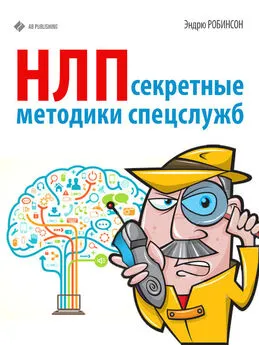Питер Янг - НЛП. Эффективные методики влияния
- Название:НЛП. Эффективные методики влияния
- Автор:
- Жанр:
- Издательство:Эксмо
- Год:2007
- ISBN:нет данных
- Рейтинг:
- Избранное:Добавить в избранное
-
Отзывы:
-
Ваша оценка:
Питер Янг - НЛП. Эффективные методики влияния краткое содержание
НЛП. Эффективные методики влияния - читать онлайн бесплатно полную версию (весь текст целиком)
Интервал:
Закладка:
Выносите оценку
По завершении упражнения уделите время оценке его результатов. Подумайте: «Что я могу сделать лучше в следующий раз?»
Учитесь на своих ошибках
Не забывайте, что все мы — ученики. Никто не ждет от вас «совершенства». Позвольте себе порой совершать «интересные ошибки» — это один из способов учиться.
«Меньше значит больше»
Техники НЛП бывают очень компактными и выполняются за несколько минут в отличие от иных терапевтических процедур, требующих многочасовых сеансов на протяжении месяцев и лет. Одна из причин этого — в том, что они независимы от содержания. Это означает, что вам нет никакой необходимости знать все детали проблемы клиента. Искусство практи
ка — в умении наблюдать перемены в физиологии клиента — отмечать изменения цвета и выражения лица, языка тела, что свидетельствует о достижении результатов.
Работа независимо от содержания
Ваша задача как помощника — наставить клиента на правильный путь. Затем вам необходимо отмечать состояние клиента на каждом этапе, степень достигнутых им перемен, что становится ясно из знаков невербальной коммуникации. Знакомство со всеми подробностями проблемы клиента обычно не очень помогает, достаточно минимума. Знание всех подробностей вызовет у вас слишком много ассоциаций и может вызвать ненужные воспоминания о собственном подобном опыте. Это может побудить вас давать советы, выражать сочувствие или даже проникнуться убеждением (ложным!), будто «у меня было все точно так же». Ваша эмоциональная вовлеченность ничем не поможет другому человеку. Ему необходимо самому разобраться со своей проблемой.
Взгляд в будущее
По завершении процесса необходимо отметить, каким образом перемены могут быть развиты и закреплены. В НЛП это называется подстройкой к будущему. Попросите клиента представить, как подобная ситуация может возникнуть в будущем (и как прежние привычки дадут о себе знать, если перемены не достигнуты). В это время обратите внимание на физиологические признаки, дабы убедиться, что вновь обретенное состояние сохраняется. Если это не так, то могут понадобиться дополнительные воздействия. Но если это так, то ваша работа завершена. Выдержите паузу, чтобы дать клиенту возможность ощутить свое новое состояние. Помните, в ка
ком замешательстве оказалась Дороти, впервые попав в Страну Оз. Требуется время, чтобы освоиться в новом многоцветном мире.
Может быть, то, что вы увидите, обретет и для вас какой-то новый, метафорический смысл. Вместо того чтобы воспринимать свой опыт буквально, постарайтесь разобраться, что он для вас значит. Что эта история добавляет к вашей реальности?
Библиография
Andreas, Steve and Andreas, Connirae, 1989, Heart of the Mind: Engaging Your Inner Power to Change With Neuro-Linguistic Programming, Real People Press, Utah.
Ardui, J, and Wrycza, P, 1994, Unravelling Perceptual Positions, in NLP World, Vol. 1, No. 2,1994,5-22.
Ashby, W Ross, 1952, Introduction to Cybernetics, John Wiley, New York.
Bandler, Richard, 1985, Using your Brain—for a Change, Real People Press, Moab, UT.
Bandler, Richard and Grinder, John, 1975, The Structure of Magic I: A Book about Language & Therapy, Science & Behavior Books, Palo Alto.
Bandler, Richard and Grinder, John, 1979, Frogs into Princes: Neuro-Linguistic Programming, Real People Press, Moab, UT.
Bandler, Richard and Grinder, John, 1982, Reframing: NeuroLinguistic Programming and the Transformation of Meaning, Real People Press, Moab, UT.
Bandler, Richard; Grinder, John; and Satir, Virginia, 1976, Changing with Families, Science and Behavior Books, Palo Alto.
Bateson, Gregory, 1972, The Logical Categories of Learning and Communication, in Steps to an Ecology of Mind: A Revolutionary Approach to Man's Understanding of Himself, Ballantine Books, NY Chandler Publishing Company.
Beibin, R Meredith, 2000, Beyond The Team, Butterworth Heinemann, Oxford.
Bennis, Warren and Biederman, Patricia Ward, 1997, Organizing Genius: The Secrets of Creative Collaboration, Nicholas Brealey Publishing, London.
Berne, Eric, 1964,1968, Games People Play: The Psychology of Human Relationships, Penguin Books, Andre Deutsch, Harmondsworth.
Blanchard, Kenneth et al, 1985, Leadership and the One Minute Manager, Fontana/Collins.
Blanchard, Kenneth; Oncken, William Jr and Burrows, Hal, 1989, The One Minute Manager Meets the Monkey, Fontana, NY Quill.
Bodenhamer, Bob and Hall, L Michael, 1996, Figuring Out People: Design Engineering with Metaprograms, Crown House Publishing, Carmarthen.
Bodenhamer, Bob and Hall, L Michael, 1999, The User's Manual to the Brain: The Complete Manual for Neuro-Linguistic Programming Practitioner Certification, Crown House Publishing, Carmarthen.
Buzan, Tony and Buzan, Barry, 2003, The Mindmap Book, revised edition, BBC Publications, London.
Caine, Michael, 2003, Talking on a BBC Radio 2 programme to celebrate his 70th birthday.
Campbell, Joseph, 1949, The Hero with a Thousand Faces, Fontana, HarperCollins Publishers, London.
Clarke, Arthur C, 1982, Profiles of the Future: an Inquiry into the Limits of the Possible, Victor Gollancz Ltd, London.
Dearden, Robert F, 1984, Theory and Practice in Education, Routledge and Kegan Paul, London.
de Bono, Edward, 1991, Six Action Shoes, HarperCollins, London.
de Bono, Edward, 1992, Serious Creativity: Using the Power of Lateral Thinking to Create New Ideas, HarperCollins, London.
DeLozier, Judith and Grinder, John, 1987, Turtles All The Way Down: Prerequisites to Personal Genius, Grinder, DeLozier and Associates, California.
Dilts, Robert, 1990, Changing Belief Systems with NLP, Meta Publications, Cupertino, California.
Dilts, Robert, 1997a, unpublished transcript, ITS Master Practitioner Training, London.
Dilts, Robert, 1997b, Visionary Leadership Skills, NLP University, Santa Cruz, CA.
Dilts, Robert, 1998, Fourth Position, NLPU website: www.nlpu.comArticle of the Month.
Dilts, Robert; Epstein, Todd and Dilts, Robert W, 1991, Tools for Dreamers: Strategies for Creativity and the Structure of Innovation, Meta Publications, Cupertino, California.
Dilts, R and DeLozier, J, 2000, Encyclopaedia of NLP, http:/ / www.nlpuniversitypress.com.
Egan, Kieran, 1997, The Educated Mind: How Cognitive Tools Shape our Understanding, The University of Chicago Press, Chicago.
Faulkner, Charles, 2003, A brief meaning of everything—a talk given at the ANLP Conference, April 2003.
Gibbons, Stella, 1932, Cold Comfort Farm, Penguin Books, Harmondsworth.
Gray, John, 1993, Men are from Mars, Women are from Venus, HarperCollins, London.
Hall, L Michael, 2000, The Spirit of NLP: The Process, Meaning and Criteria for Mastering NLP, Revised Edition, Crown House Publishing, Carmarthen.
Hall, L Michael, 2002, Always Ask ,Wh/?—The Redemption of Why, Anchor Point, Vol 16 #5, May 2002, pp. 24-29.
Korzybski, Alfred, 1958, Science and Sanity: An Introduction to NonAristotelian Systems and General Semantics, International NonAristotelian Library Publishing Company.
Kuhn, Thomas S, 1970, The Structure of Scientific Revolutions, 2nd edition, enlarged. The University of Chicago Press, Chicago.
Lawson, Hilary, 2001a, Closure: A Story of Everything, Routledge, London.
Lawson, Hilary, 2001b, Stephen Hawking is Wrong, Prospect Magazine, November 2001 www.prospect-magazine.co.uk/
Lee, Harper, 1960, To Kill A Mockingbird, Arrow, London.
Mamet, David, 1991, On Directing Film, Faber & Faber, London.
McCarthy, Bernice and Morris, Susan, 1994, The4MAT CourseBook, Vol. 1, Excel, Barrington, Illinois.
McWhinney, Will, 1995, The Matter of Einstein Square Dancing with Magritte, Cybernetics & Human Knowing, Vol 3, No 3.
McWhinney, Will, 1997, Paths of Change: Strategic Choices for Organisations and Society, Sage Publications, London.
McWhinney, Will; Webber, James; Smith, Douglas and Novokowsky, Bernie, 1997, Creating Paths of Change: Managing Issues and Resolving Problems in Organisations, Sage Publications, London.
McWhirter, John, 2002, Remodelling NLP, Part 13A, Rapport #56.
Pepper, Stephen, 1942, World Hypotheses: A study of evidence, University of California Press, California.
Persaud, Raj, 2003, From the Edge of the Couch: Bizarre psychiatric cases and what they teach us about ourselves, Bantam Press, London.
Pine, В Joseph and Gilmore, James H, 1999, The Experience Economy: Work is Theatre & Every Business a Stage, Harvard Business School Press.
Handy, Charles, 1978, 1985, 1991, Gods of Management: The Changing Work of Organisations, 3rd edition, Business Books, Random Century Limited, London.
Heinlein, Robert A, 1961, Stranger in a Strange Land, GF Putnam and Sons.
Heinlein, Robert A, 1980, The Number of the Beast, New English Library, London.
Heller, Joseph, 1961, Catch-22, Transworld Publishers, London.
Hofstadter, Douglas R, 1985, Metamagical Themas: Questing for the Essence of Mind and Pattern, Penguin Books, London.
Honey, Peter and Mumford, Alan, 1986, Using Your Learning Styles, Peter Honey, Maidenhead.
Читать дальшеИнтервал:
Закладка:










